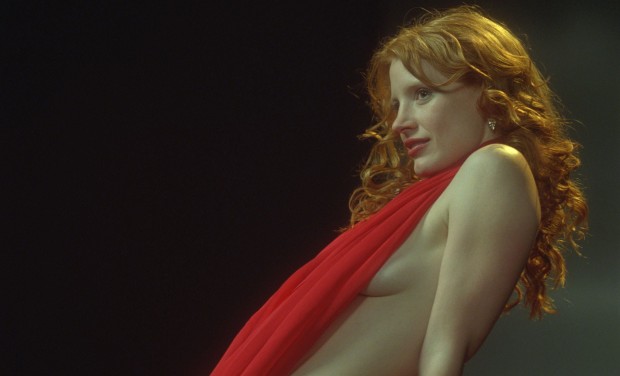You have no items in your cart. Want to get some nice things?
Go shoppingAl Pacino directs himself to his best performance in years, in this dark and powerful adaptation of Oscar Wilde’s play.

Before reviewing Al Pacino’s fourth film as a director, it’s worth noting the story behind it. I’m not referring to Oscar Wilde’s previously banned play. Instead, I mean the exhausting decision taken by Pacino to perform the lead role in a theatrical revival of Salomé at night, while directing a filmed version of the same stage production during the day, and simultaneously directing a documentary about the making of both. And so it is that both Salomé and its accompanying documentary, Wilde Salomé, are being screened as a double bill this month at the BFI, complete with a Q&A session with stars Jessica Chastain and Al Pacino.
So, on to the film. What is Salomé about? It is an adaptation of Oscar Wilde’s 1891 tragedy about the death of John the Baptist, loosely based on the Biblical account of his beheading at the behest of King Herod’s stepdaughter Salomé. In short, Salomé lusts after John while Herod lusts after Salomé; it becomes a cat-and-mouse affair as each person uses their various resources to get what they want. John has the strength of the holy spirit; Herod has the might of a king; Salomé has the allure of her beauty. The play is a peculiar beast formed of intense foreboding, overt sexuality and incestuous themes, with a sly dose of criticism of the powers that be. Luckily, Pacino’s film captures it brilliantly.
Salomé is a ‘filmed play’ – that is, a recorded version of the stage production using the same actors, costumes and set. However, rather than be confined by the artificial stage setting as so many other ‘filmed plays’ have been, Pacino manages to turn his drab studio into a major asset, letting the simplistically abstract art direction and droning musical score establish a constant and oppressive mood. Pacino uses a lot of close-ups to reinforce the sense of claustrophobia, choosing only to change the scene when the story cuts to John the Baptist in his prison. Unlike the theatrical setting of the main action, John stands in a pool of dirty water, illumined by the moon’s natural light, and surrounded by stone walls. He frequently beats these to emphasise his passionate tirades against the despotic king and his family. John exists in a tangible world of grim reality; Herod and his acolytes occupy an empty artifice where they cannot see the darkness with which their selfish deeds surround them.
However, you have to wonder if these artistic flourishes stem from Pacino, or were merely inherited from the staged version he’s adapting. Such doubts especially come to mind when he makes some strange editing choices and uses clumsy camera angles. He also begins the film with textual summaries of the main characters, replete with still images of the actors playing them, as if throwing the play’s programme on the screen. It’s not necessary and suggests Pacino has misunderstood his likely audience.
Nonetheless, even Pacino’s free-wheeling direction cannot distract from the tremendous performances in this film. Kevin Anderson is a powerful presence as John the Baptist and it’s wonderful to see Roxanne Hart in such a meaty role as Herodias, Salomé’s mother. Both just about hold their own against Pacino: after years of coasting and phoning it in, he directs himself to one of the best performances of his career, playing Herod like a whining, spoiled baby. He brilliantly portrays the drunken king as the reasonable yet foolish man Wilde intended, using his inebriated slurs as a source for humour and sympathy, sometimes within the same monologue.
Pacino threatens to steal the show throughout, but Chastain walks away with the picture in the end. As Salomé she oozes sensuality and wiliness but effortlessly switches to a more naïve manner, perfectly expressing Salomé’s profound disbelief that the Baptist can resist her charms. In a way, both Salomé and Herod are children and therefore perfectly suited to each other; but contempt is the operative word in defining the relationships between Wilde’s characters.
Salomé is probably the most dynamic and successful ‘filmed play’ I have ever seen, making a virtue of its closed set and modest production values to create an intimate and intimidating atmosphere. However, Pacino’s direction is a little too loose to feel deliberate, and there is a slightly amateurish quality to the camera work and sound editing that occasionally take you out of the drama. But just when you think you are out it drags you back in, boasting a great atmosphere generated by excellent lighting and music. Above all else, it’s tremendously acted.
A double bill of Salomé and Wilde Salomé will be presented at the BFI Southbank on Sunday 21st September and followed by a Q&A with Al Pacino and Jessica Chastain that will be broadcast live via satellite to cinemas across the UK and Ireland. The unique event will be hosted by Stephen Fry.

About Robin McConnell
Robin is an obsessive film fanatic and occasional person. When he is not watching films or editing Litro Film & Media he can be found writing and producing the Alltime channels on Youtube. He is often distracted by the need to write scripts and short stories.




